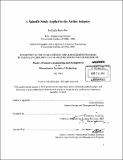A spinoffs study applied to the airline industry
Author(s)
Kutscher, Erika
DownloadFull printable version (4.778Mb)
Other Contributors
Massachusetts Institute of Technology. Engineering Systems Division.
Advisor
Richard de Neufville.
Terms of use
Metadata
Show full item recordAbstract
Airlines have been recently debated the management of some of their non-core divisions, such as the Frequent Flyer Program (FFP).A spinoff is a form of corporate contraction that many companies have recently chosen. Through a spinoff, both the parent company and the divested subsidiary can each focus on their own activity, which translates into a better performance of both entities. This thesis studies the circumstances in which a spinoff is a good strategy to pursue, along with some important issues that must be considered when reaching agreements. Spinoffs are basically a "downsizing" of the parent firm; therefore, the smaller firm must be economically more viable by itself than as a part of its parent company. The motivation for analyzing this particular topic comes from a question of current interest: Under what circumstances is it advantageous for an airline to spin off its Frequent Flyer Program, or other divisions that are not related with the airline's operation? In this thesis, an extensive literature review introduces the reader to the different forms of corporate contraction and their performance under different circumstances. Three cases related to the airline industry follow: the spinoffs of TripAdvisor from the web agency Expedia, of Air Canada's FFP Aeroplan, and of American Airline's distribution system Sabre. These three cases illustrate some of the key issues that must be carefully considered when spinning off a subsidiary. The thesis concludes that spinoffs are a smart strategy when the focus of the spun off division is different from that of the parent company. However, to safeguard future business relationships, the two entities must negotiate detailed agreements that are robust enough to perform successfully in all foreseeable circumstances.
Description
Thesis (S.M. in Engineering and Management)--Massachusetts Institute of Technology, Engineering Systems Division, 2012. Cataloged from PDF version of thesis. Includes bibliographical references (pages 73-74).
Date issued
2012Department
Massachusetts Institute of Technology. Engineering Systems DivisionPublisher
Massachusetts Institute of Technology
Keywords
Engineering Systems Division.